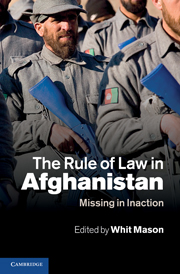Book contents
- Frontmatter
- Contents
- Contributors
- Preface and acknowledgements
- 1 Introduction
- PART I The scope and nature of the problem
- PART II The context
- PART III The political economy of opium
- PART IV Afghan approaches to security and the rule of law
- PART V International interventions
- PART VI Kandahar
- 15 No justice, no peace
- 16 Kandahar after the fall of the Taliban
- PART VII Conclusion
- Index
16 - Kandahar after the fall of the Taliban
Published online by Cambridge University Press: 01 June 2011
- Frontmatter
- Contents
- Contributors
- Preface and acknowledgements
- 1 Introduction
- PART I The scope and nature of the problem
- PART II The context
- PART III The political economy of opium
- PART IV Afghan approaches to security and the rule of law
- PART V International interventions
- PART VI Kandahar
- 15 No justice, no peace
- 16 Kandahar after the fall of the Taliban
- PART VII Conclusion
- Index
Summary
I was born in the district of Khakrez, in relatively secure times a two-hour drive north-west of Kandahar City. It was 1980, the year after the Soviets began unevenly occupying Afghanistan. When I was still young, my family and I, like millions of others, fled to Pakistan and began the difficult life of refugees. Most of the time we lived in Quetta, the capital of Baluchistan, the huge, underpopulated province across the border from Kandahar. In 2001 I returned to Kandahar with Akrem Khakrezwal, and had the privilege of working as his assistant as he became chief of police, successively, in Kandahar, Mazar-i Sharif and Kabul. On a visit home to Kandahar in 2005, he was killed by a huge bomb planted in a mosque. This crime was never seriously investigated. I then went to work as a governance adviser for the Canadian provincial reconstruction team. Two years later my boss there, a kind man approaching retirement named Glynn Berry, was killed by another bomb. It happened in district 5 of Kandahar City. A man was detained for that murder but Governor Khalid released him on the recommendation of Ahmed Wali Karzai, President Karzai's half-brother and head of Kandahar's provincial council. I, like everyone from Kandahar, have seen a lot of injustice. And yet, despite injustice being usual, it has never become a norm; we have continued to expect and yearn for better.
- Type
- Chapter
- Information
- The Rule of Law in AfghanistanMissing in Inaction, pp. 308 - 316Publisher: Cambridge University PressPrint publication year: 2011
- 1
- Cited by

